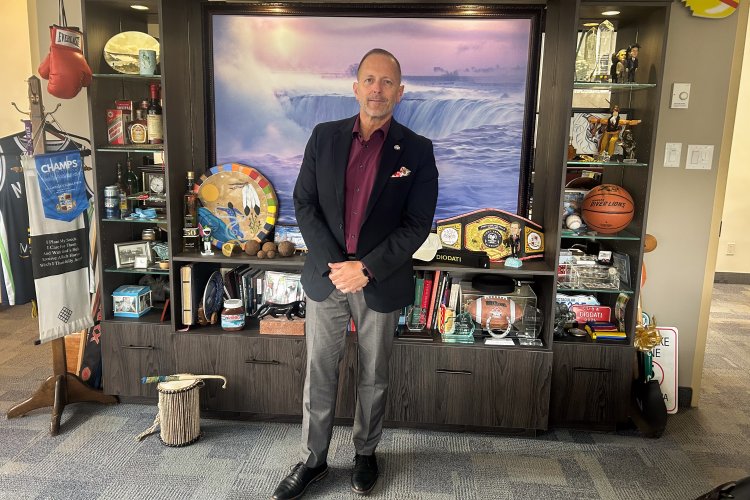‘We Didn’t Even See the Border — Until Now’: The Impact of Trump's Policies on Canadian-American Relations
Trump's imposing tariffs are significantly impacting the forthcoming Canadian election and are also influencing personal relationships between the two nations.

“When he came out with The Art of the Deal in the mid ’80s, I bought it and loved it,” Diodati shared during a conversation in his city hall office. “I thought, ‘Oh, my God, he’d be an incredible president. We’d finally have a businessman running the country instead of a politician.’”
However, Diodati's views shifted dramatically following Trump's election in November and his subsequent disparaging remarks about Canada, calling it the “51st state,” alongside implementation of harsh tariffs on Canadian goods. Diodati has since distanced himself from the man he once admired.
This change is symbolized by a display in his office: two prominent hats reading “CANADA IS NOT FOR SALE” and featuring a crossed-out “51.” They rest beside cannonballs from the War of 1812—the last time the U.S. attempted military conquest of Canada.
“I liked him. I was still defending him in the beginning [of his second term],” Diodati recounted. “It was when he put us in his sights and made us look like the bad guy — more than anything, it was just hurtful … and then the 51st state talk, it went from hurtful to offensive.”
Diodati, 59, embodies the sentiments of many Canadians grappling with the changing border dynamics. Previously an afterthought for those living in border towns, the border is now a focal point of concern, particularly evident from city hall’s rooftop. Residents, once accustomed to crossing easily for work or leisure, now experience heightened tensions, and many in Diodati's community are so outraged that they refuse to travel to the U.S. or buy American products. With Canada’s April 28 elections approaching, the relationship with the U.S. has emerged as the central campaign issue, carrying significant economic implications as well as more subtle emotional costs.
“Growing up in a border town, living in a border town, we don’t even see the border,” Diodati reflected. “Now, it’s more measured. People are thinking twice. Canadians aren’t feeling as welcome coming to the U.S. And it’s a little bit sad, because that’s not how it was or should be.”
Nothing exemplifies “how it was” better than Diodati’s friendship with Chris Greco, his longtime pal from Buffalo who he hasn’t seen since before Trump took office.
The bond between Diodati and Greco has history, supported by a shared soundtrack from Coldplay. They met over 25 years ago as young salesmen, pitching multi-level marketing to audience members with the backdrop of “Viva La Vida.”
“ He’s just a great guy,” Diodati reflected on Greco. “Heart of gold. We connected instantly, and we’ve been friends ever since, and it’s been probably 25 years.”
Greco, on his part, sees Diodati as family. “You could ask him for anything, and he’d be there, no questions asked. And he wouldn’t ask for anything in return. He’s like a brother to me.”
Living less than an hour apart, both men have daughters who were born close in age. Over the years, they have shared numerous moments, often sending snippets of “Viva La Vida” to one another when they hear it at various venues.
Their initial camaraderie involved successful business ventures that led to trips to the Bahamas and Hawaii. After parting ways for different careers—Diodati in politics and Greco in real estate—they transitioned to family gatherings and leisurely meals.
Greco would often make the drive to visit Diodati. “I’ll shoot up there and we’ll go to a restaurant, and of course it’s the best table, no one lets us pay,” Greco noted.
However, since the summer cookout at Greco’s home, they haven't had significant time together and have been talking less frequently. When they do connect, discussions about Trump and politics are largely avoided. Both maintain that they refuse to let national tensions drive a wedge between them, a strategy that appears to be working. Nonetheless, they acknowledge the broader impact politics has had on relationships.
“Lots of people have lost family and friends over this,” Greco remarked. “They don’t talk anymore.”
The two friends exhibit different views regarding their respective reactions to Trump. Greco tends to downplay Trump’s bombastic nature, primarily concerned about how tariffs may affect his real estate business. Conversely, Diodati perceives Trump’s decisions as more serious, particularly as they influence the daily lives of his constituents.
“In Niagara Falls, we were blessed not because of anything any person did. It’s because God created the falls. The universe gifted us this incredible, natural, iconic, magnificent wonder,” Diodati expressed. “But right now, everyone’s been on pins and needles as we wait for the shoe to drop and see what the latest mercurial decision to come out of the president’s office will be.”
Niagara Falls, New York, and Niagara Falls, Ontario, are neighboring cities that have experienced diverging fortunes for some time. The former has been characterized by decline. Following its peak population of over 102,000 in 1960, it has seen a dramatic drop, with numbers plummeting by more than 51 percent by 2010 and continuing to fall to under 47,000.
In stark contrast, Niagara Falls, Ontario, is thriving. With a population exceeding 111,000 in 2024—a rise from 67,000 in 1971—its growth has largely been fueled by international migration and tourism. Diodati, having run as an independent candidate and unseating incumbent mayor Ted Salci in 2010, has focused on a pro-business agenda, leading to three re-elections, including a decisive win in 2022.
While Western New York grapples with de-industrialization, Clifton Hill in Niagara Falls, Ontario, flourishes as a bustling tourist attraction, complete with casinos and a range of souvenir shops full of Canada-themed merchandise.
Despite the economic trajectories suggesting disparate paths, a long-standing unity has existed between the two cities.
“Our economies are totally integrated, and our personalities — a lot of my friends married American girls and vice-versa,” Diodati stated. Yet he remains contemplative about how swiftly situations can change.
“Did you think before you got in your car today, ‘I hope my car starts?’” Diodati posed. “You reached into your fridge at some point today, and you figured it would be working and there would be something to eat. And the electricity would work. And your coffee would be good to go. So, we don’t think about it until it breaks. Until the furnace craps out. Until the roofs leak. Until your car doesn’t start.”
The Canada-U.S. relationship once seemed unshakable, particularly for border residents who viewed the two countries as part of a single ecosystem. Many Canadians were more concerned about the economic decline in Western New York affecting their own fortunes.
Now, the question for Diodati is whether there’s a way to rebuild this connection. Can the two nations mend their frayed ties, just as he hopes to preserve his friendship with Greco?
“We took for granted that we’ve got such an incredible relationship with our neighbors to the south. We figured it would never go away, until it threatens to be taken away,” he stated.
“It’s like a relationship going through trials and tribulations.”
Anna Muller for TROIB News
Find more stories on Business, Economy and Finance in TROIB business












